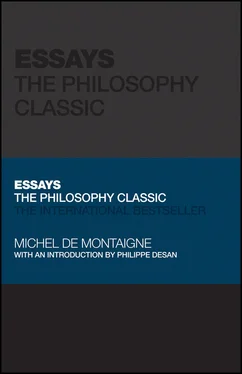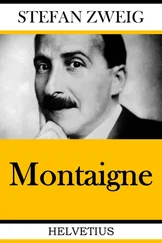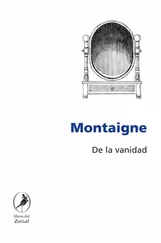Michel de Montaigne - Essays
Здесь есть возможность читать онлайн «Michel de Montaigne - Essays» — ознакомительный отрывок электронной книги совершенно бесплатно, а после прочтения отрывка купить полную версию. В некоторых случаях можно слушать аудио, скачать через торрент в формате fb2 и присутствует краткое содержание. Жанр: unrecognised, на английском языке. Описание произведения, (предисловие) а так же отзывы посетителей доступны на портале библиотеки ЛибКат.
- Название:Essays
- Автор:
- Жанр:
- Год:неизвестен
- ISBN:нет данных
- Рейтинг книги:3 / 5. Голосов: 1
-
Избранное:Добавить в избранное
- Отзывы:
-
Ваша оценка:
- 60
- 1
- 2
- 3
- 4
- 5
Essays: краткое содержание, описание и аннотация
Предлагаем к чтению аннотацию, описание, краткое содержание или предисловие (зависит от того, что написал сам автор книги «Essays»). Если вы не нашли необходимую информацию о книге — напишите в комментариях, мы постараемся отыскать её.
Essays: The Philosophy Classic
Essays: The Philosophy Classic
Essays — читать онлайн ознакомительный отрывок
Ниже представлен текст книги, разбитый по страницам. Система сохранения места последней прочитанной страницы, позволяет с удобством читать онлайн бесплатно книгу «Essays», без необходимости каждый раз заново искать на чём Вы остановились. Поставьте закладку, и сможете в любой момент перейти на страницу, на которой закончили чтение.
Интервал:
Закладка:
THE MONTAIGNE METHOD
It is true that Montaigne contradicts himself, which makes reading the Essays difficult, and sometimes problematic. The danger with Montaigne is to take him at his word and discover a few pages later that he says the opposite of what he had previously written. An analysis of his declarations organized in themes therefore has its limits. And yet, Montaigne offers personal and social considerations worth meditating on, not as a doctrine or a philosophy, but rather as attempts to seize a problem at a specific time. The Essays work as a laboratory that allows us to identify some essential principles of a model of individual and society that is almost always unrealizable, but nonetheless thinkable. For Montaigne, experimentation prevails over application, and the rules resulting from observation and experience never quite allow us to conceive of a social science, or to pass from theory to practice.
Rather than developing a grand analysis of humankind, Montaigne prefers to describe what he observes on the ground (for example, during his travels through Germany, Switzerland, and Italy) or what has been observed directly and without mediation by others (like the sailor who travelled to the New World and was employed by Montaigne). Thus, his reflections on mores and customs should not be seen as philosophical investigations on an abstract and unattainable human condition. For this reason, we cannot speak of a Montaignian ontology, or philosophy of being.
Montaigne strives to understand his own mores – always in their political, religious, and cultural context – in relation to other cultures, other schools, and other systems of thought. But should we only be amazed at otherness? Is it possible to take an inventory of people around the world and infer fundamental rules? These questions are always present in the Essays . Even a cursory reading makes it clear that Montaigne does not believe in human “essence”. Humans are incredibly varied across cultures, and so the category of “humanity” is problematic. It is safer to just observe singular behaviors and actions.
Until the seventeenth century, resemblance as an organizing principle was enough to create the illusion of a theory of knowledge, of a hidden order which brought together everything that seemed, at first glance, different. The Spanish theologians of the Conquista looked at the Indians of the New World in this way, i.e. as a pretext for the domination of other cultures because they could not find in these societies what the West valued (writing, monuments, private property). This ideological bias is criticized by Montaigne in his essay “On Cannibals”. On the contrary, valuing difference as an enhancement of his own self, Montaigne delights at seeing himself in the eyes of the cannibals.
Because Montaigne is always aware of his own cultural and social environment, he carefully avoids moral judgment; his interest in different cultures and customs is only illustrative of human complexity. He leaves it to others to find an order in the world and its peoples, and the “progress” of civilizations does not interest him very much. As a good observer, Montaigne turns his gaze towards the generic Other (neighbors, foreigners, cannibals) and tries to understand the irreducibility of cultural specificities: “Every nation has particular opinions touching their use, and particular rules and methods in using them” (II, 37). The “empire of custom” (I, 22) makes us confuse the universal qualities of humans with the importance in our own societies of these “qualities”. Being French or German, according to Montaigne, is in fact nothing more than following the customs of these countries. The power of customs even tends to modify human physiology: “You make a German sick if you lay him upon a mattress, as you do an Italian if you lay him on a feather-bed, and a Frenchman, if without curtains or fire. A Spanish stomach cannot hold out to eat as we can, nor ours to drink like the Swiss” (III, 13).
BIRTH OF THE MODERN, SKEPTICAL SELF
Throughout the Essays , freedom of personal judgment is privileged over society and education; the subject can always understand the world by himself and for himself. This self-sufficiency of the individual, out of its historical reality, also represents a trap for many modern readers of the Essays . In fact, one finds few references to possible political actions in Montaigne's writings; the accent is almost always placed on commenting on the world rather than changing it. Montaigne's trademark is the moment of introspection, withdrawal, and self-sufficiency.
The possibility of a theoretical truth of the world unconsciously conforms with our own bourgeois mentality, precisely because it isolates the subject from its immediate social and political environment. It is true that Montaigne offers a foundation for the liberal ideology that will soon assert itself from the eighteenth century on. Montaigne's doubts and questions about authority (leading to independence of thought and eventually liberty), and the confidence in his own judgment, have been associated with the birth of modern liberalism. A modern self emerges that is distanced from the authorities of the past, enjoying the victory of private judgment over institutions that limit individual freedom. However, this type of ideological appropriation often ignores the biography of Montaigne. He was not a political thinker, and the Essays were conceived in a specific political, religious, and social context.
Other critics have seen in Montaigne an adept of skepticism, but they seem to forget that one is not born a sceptic, one becomes one. Skepticism is not a philosophical choice for Montaigne; it is anchored in the reality of his time and resulted from a slow deterioration in moral values during the second half of the sixteenth century. With Montaigne, it is difficult to speak of skepticism in the singular – as the mere expression of the philosophical doctrine of this name. One should rather speak of “skeptical moments” in the plural. These moments were produced by personal experiences which were first and foremost of a political nature before becoming, eventually, a modus operandi . Indeed, it is difficult not to link philosophy and political experiences in Montaigne's work.
We have thus often confused a philosophical system – Skepticism – with what, in Montaigne's Essays , is essentially an inclination or a posture of the mind in the face of specific negative or dangerous political situations. The Essays are strewn with skeptical conclusions and impressions that are the result of Montaigne and his estate being in the middle of an atmosphere of unrest and terror. Shocked by the events he lived through – from the Saint-Bartholomew's Day massacre in 1572 to the assassination of Henry III in 1588 – it is very difficult to regroup his conflicting reactions and attitudes into a doctrine. One thing is certain: the religious situation of France between 1563 (beginning of the religious wars) and 1592 profoundly influenced the writing of Montaigne's book and nourished his skepticism.
THE NECESSITY OF DOUBT
Resistant to models and systems, Montaigne takes pleasure in the fortuitous and contradictory aspect of the multitude of things encountered. He attempts to seize them in the fleeting moment of personal judgment that must be understood within its historical milieu. Judgment is never final, because it expresses a point in time and space, of this man in this world.
Montaigne's biography is filled with these “doubt moments” which, through their repetition, create in the author a skeptical reflex which in time becomes a natural reaction. Yet the reflex has the function of helping him rediscover a moral stability in a time of upheaval – a time when as he famously puts it, “the world eternally turns round” (III, 2).
Читать дальшеИнтервал:
Закладка:
Похожие книги на «Essays»
Представляем Вашему вниманию похожие книги на «Essays» списком для выбора. Мы отобрали схожую по названию и смыслу литературу в надежде предоставить читателям больше вариантов отыскать новые, интересные, ещё непрочитанные произведения.
Обсуждение, отзывы о книге «Essays» и просто собственные мнения читателей. Оставьте ваши комментарии, напишите, что Вы думаете о произведении, его смысле или главных героях. Укажите что конкретно понравилось, а что нет, и почему Вы так считаете.












